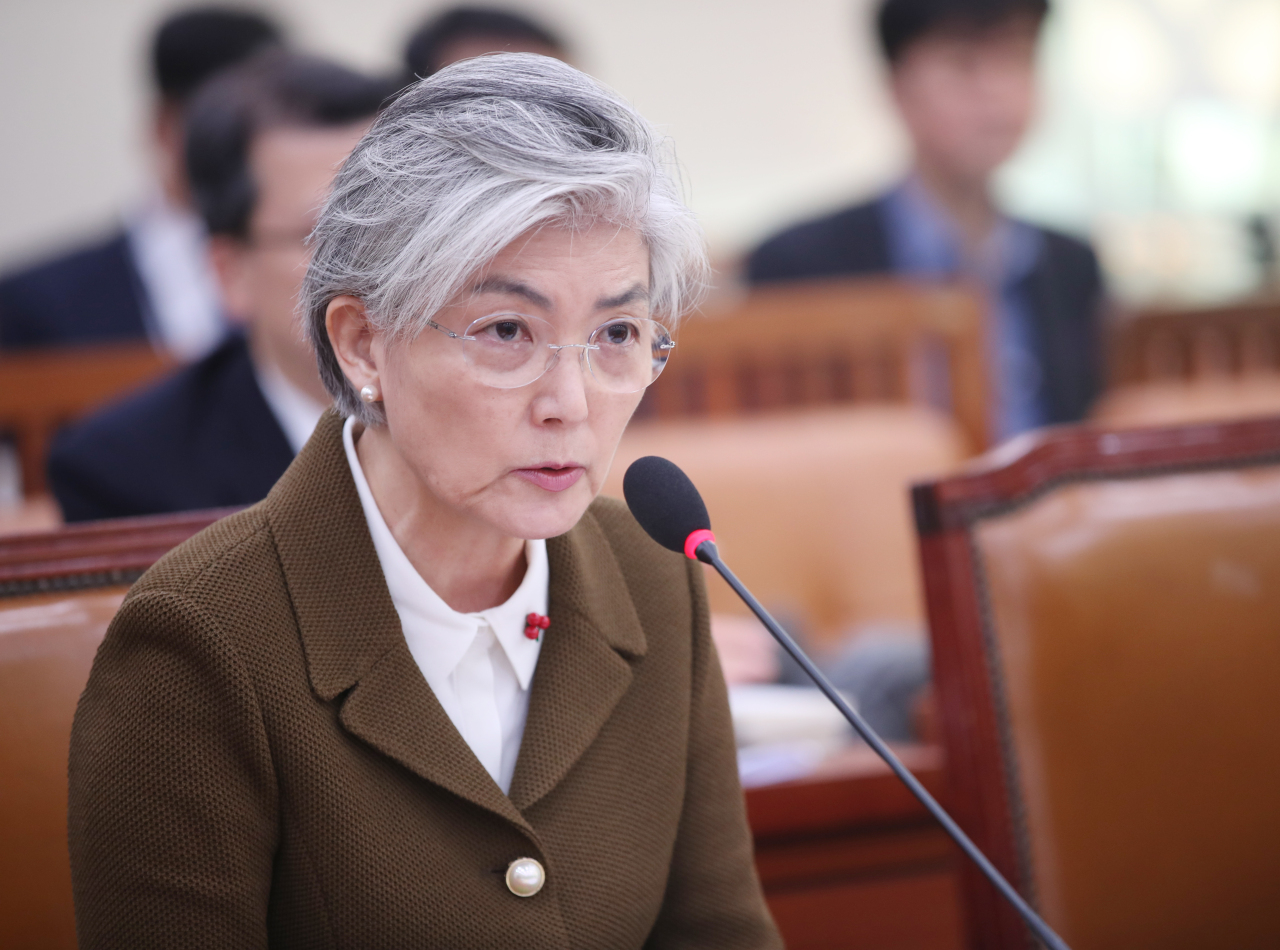South Korea’s Foreign Minister Kang Kyung-wha said Thursday that Seoul has so far made no decision on the US request to send troops to the Strait of Hormuz, adding that its stance might differ from Washington’s.
“I think the US position and ours may not necessarily be the same, when it comes to our analysis of the situation and considering our bilateral relationships with the countries in the Middle East,” Kang told a plenary session of the National Assembly’s foreign affairs and unification committee in response to a lawmaker’s question. The Strait of Hormuz is the world’s largest oil chokepoint and has recently become the focal point of heightened conflict between the US and Iran.
“We have had an economic relationship with Iran for a long time, and we are still cooperating on humanitarian aid and education at this moment in time,” she said. “(The US) continues to call on the international community, including Korea, to take part in its plan to achieve maritime security and freedom of navigation. The safety of Korean nationals and vessels is our first priority.”
 |
Foreign Minister Kang Kyung-wha speaks during a plenary session of the National Assembly’s foreign affairs and unification committee on Thursday. (Yonhap) |
Kang added that she hopes to discuss this issue next week, along with ongoing defense cost-sharing negotiations, with her counterpart US Secretary of State Mike Pompeo. The two are scheduled to meet on Tuesday in San Francisco.
They are also planning to discuss the latest Middle East situation and how to deal with North Korea, amid escalating tension. Japanese Foreign Minister Toshimitsu Motegi, who is also visiting San Francisco, may hold trilateral or bilateral talks with Kang and Pompeo, though such meetings have not been finalized.
On Tuesday, US Ambassador to Korea Harry Harris said in an interview with a local broadcaster that he hoped Seoul would participate in efforts to safeguard the US-led maritime force in the Strait of Hormuz, renewing a call issued by the US in June for its allies, including Korea, to take part in the coalition.
Since then Seoul has been mulling the request, and there is speculation that the Navy’s anti-piracy Cheonghae Unit, which has been stationed in the Gulf of Aden, could be redeployed to the Strait of Hormuz, which is four days away.
But since the US killing of Qassem Soleimani, the head of the Islamic Revolutionary Guard’s elite Quds Force, tension between the US and Iran has escalated, and there are increasing calls in Korea for the government to reject the US request amid fears that Koreans could get drawn into the violence.
On Thursday, civic groups here asked the government to refuse to dispatch troops to the Middle East, saying the Korean military shouldn’t be used to help the US provoke wars.
During the session, Kang stressed that the Strait of Hormuz and defense cost-sharing talks were separate issues and would not be linked in any way. Local media outlets have reported that the Korean government may send troops to the Strait of Hormuz as a bargaining chip to get a better defense-cost sharing deal. The US had initially demanded a fivefold increase in Korea’s share of the expenses to maintain US troops here, to nearly $5 billion.
“The Korea-US defense cost-sharing agreement and the current Strait of Hormuz situation are separate matters,” she said. “The US has never mentioned the Strait of Hormuz (during the defense cost-sharing talks).”
Despite some signs that the military confrontation in the Middle East may be easing after Donald Trump’s speech Wednesday signaling that the US was pulling back from the brink of war with Iran, Seoul said it was still monitoring the situation closely.
Kang stressed that the government would remain prepared for any possible outcome by communicating with diplomatic missions in the area. “As of yesterday afternoon, it was confirmed that all Korean nationals were safe,” she said, referring to the 1,600 Korean citizens in Iraq.
“At this moment, we made a judgment not to consider the evacuation of Korean citizens, but in the event of a sudden change, we will stay vigilant and prepare for the possibility of withdrawal.”
By Ahn Sung-mi (
sahn@heraldcorp.com)




![[Herald Interview] 'Trump will use tariffs as first line of defense for American manufacturing'](http://res.heraldm.com/phpwas/restmb_idxmake.php?idx=644&simg=/content/image/2024/11/26/20241126050017_0.jpg)

![[Health and care] Getting cancer young: Why cancer isn’t just an older person’s battle](http://res.heraldm.com/phpwas/restmb_idxmake.php?idx=644&simg=/content/image/2024/11/26/20241126050043_0.jpg)

